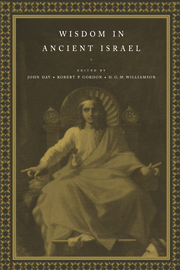Book contents
- Frontmatter
- Contents
- List of abbreviations
- Introduction
- Part 1 The ancient near eastern setting
- Part 2 Old Testament and Apocryphal texts
- Part 3 Themes
- 17 Were there schools in ancient Israel?
- 18 The trees, the beasts and the birds: fables, parables and allegories in the Old Testament
- 19 The personification of Wisdom
- 20 Wisdom and the goddess
- 21 Wisdom at Qumran
- 22 The interpretation of wisdom in nineteenth-century scholarship
- 23 Wisdom and Old Testament theology
- Biographical note: John Adney Emerton
- Bibliography of the works of John Adney Emerton
- Indexes
- Principal biblical and apocryphal references
22 - The interpretation of wisdom in nineteenth-century scholarship
Published online by Cambridge University Press: 16 October 2009
- Frontmatter
- Contents
- List of abbreviations
- Introduction
- Part 1 The ancient near eastern setting
- Part 2 Old Testament and Apocryphal texts
- Part 3 Themes
- 17 Were there schools in ancient Israel?
- 18 The trees, the beasts and the birds: fables, parables and allegories in the Old Testament
- 19 The personification of Wisdom
- 20 Wisdom and the goddess
- 21 Wisdom at Qumran
- 22 The interpretation of wisdom in nineteenth-century scholarship
- 23 Wisdom and Old Testament theology
- Biographical note: John Adney Emerton
- Bibliography of the works of John Adney Emerton
- Indexes
- Principal biblical and apocryphal references
Summary
Introduction
Several times during the course of this century, the Society for Old Testament Study has provided general surveys of scholarly trends, but initially wisdom played no noticeable role in them. In A. S. Peake (ed.), The People and the Book (Oxford, 1925), wisdom was merely mentioned. H. W. Robinson (ed.), Record and Revelation (Oxford, 1938), devoted only a few pages to it, in O. Eissfeldt's discussion of ‘modern criticism’. Not until 1951 was it treated in a chapter of its own, in H. H. Rowley (ed.), The Old Testament and Modern Study (Oxford). The chapter was written by W. Baumgartner, and this was continued – on an equal level – by J. A. Emerton in G. W. Anderson (ed.), Tradition and Interpretation (Oxford, 1979). This sequence clearly shows how wisdom gained – and retained – importance in our field following the first quarter of this century.
The bibliographies which follow the surveys of Baumgartner and Emerton make possible another peripheral observation. Nearly two-thirds of the books contained in Baumgartner's bibliography (1951) are in German (48 out of 79), while in 1979, when Emerton compiled his, the number had been reduced to less than a half (28 out of 60). Even if the possible influence of the background of the two authors is taken into account, these numbers are most likely symptomatic of the decreasing weight of German-speaking scholarship in this field; corresponding statistics for the period between 1979 and 1995 would show that even more strikingly.
- Type
- Chapter
- Information
- Wisdom in Ancient Israel , pp. 257 - 268Publisher: Cambridge University PressPrint publication year: 1995
- 1
- Cited by



